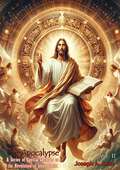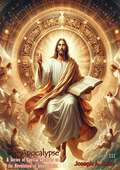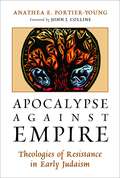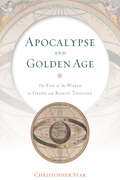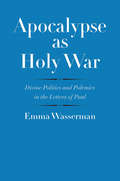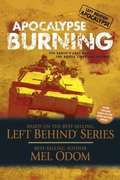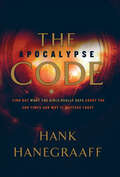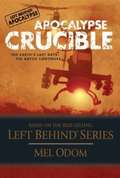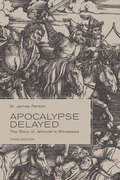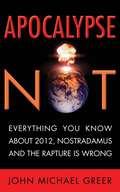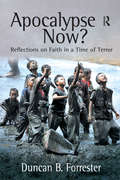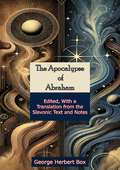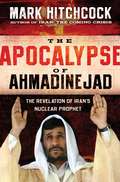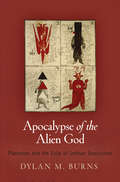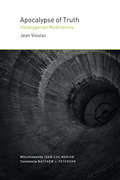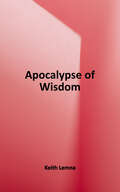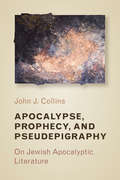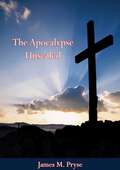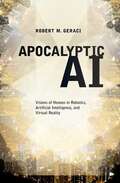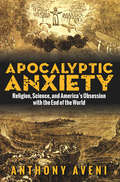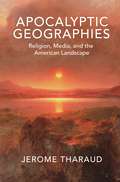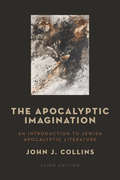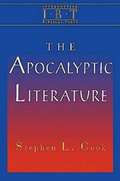- Table View
- List View
The Apocalypse A Series of Special lectures on the Revelation of Jesus Christ Vol. II [Revised Text] (The Apocalypse A Series of Special Lectures on the Revelation of Jesus Christ [Revised Text] #2)
by Joseph A. SeissDive into the profound mysteries of the Book of Revelation with Joseph A. Seiss's The Apocalypse: A Series of Special Lectures on the Revelation of Jesus Christ. This seminal work offers an in-depth exploration of one of the Bible’s most enigmatic and compelling books, providing readers with a comprehensive understanding of its prophetic visions and theological significance.Joseph A. Seiss, a renowned theologian and biblical scholar, brings his extensive knowledge and insightful perspective to this series of lectures. With meticulous attention to detail and a deep reverence for the scriptural text, Seiss deciphers the complex symbolism and intricate imagery found in the Book of Revelation. He guides readers through its chapters, offering clear explanations and thoughtful interpretations that illuminate the apocalyptic messages conveyed by the Apostle John.The Apocalypse covers a wide range of themes, including the nature of divine judgment, the ultimate triumph of good over evil, and the promise of a new heaven and new earth. Seiss's lectures delve into the historical context of the Revelation, its place within the broader biblical canon, and its relevance to contemporary Christian faith and practice.Throughout the book, Seiss emphasizes the hope and encouragement that the Revelation offers to believers, portraying it not as a text of fear, but as a profound source of comfort and inspiration. His eloquent and accessible writing style makes complex theological concepts understandable, inviting readers to engage deeply with the spiritual truths of the Apocalypse.Join Joseph A. Seiss in unraveling the mysteries of the Book of Revelation and discover the powerful and enduring message of hope and redemption it contains. This timeless work continues to inspire and enlighten readers, offering a profound exploration of the ultimate revelation of Jesus Christ.
The Apocalypse A Series of Special lectures on the Revelation of Jesus Christ Vol. III [Revised Text] (The Apocalypse A Series of Special Lectures on the Revelation of Jesus Christ [Revised Text] #3)
by Joseph A. SeissDive into the profound mysteries of the Book of Revelation with Joseph A. Seiss's The Apocalypse: A Series of Special Lectures on the Revelation of Jesus Christ. This seminal work offers an in-depth exploration of one of the Bible’s most enigmatic and compelling books, providing readers with a comprehensive understanding of its prophetic visions and theological significance.Joseph A. Seiss, a renowned theologian and biblical scholar, brings his extensive knowledge and insightful perspective to this series of lectures. With meticulous attention to detail and a deep reverence for the scriptural text, Seiss deciphers the complex symbolism and intricate imagery found in the Book of Revelation. He guides readers through its chapters, offering clear explanations and thoughtful interpretations that illuminate the apocalyptic messages conveyed by the Apostle John.The Apocalypse covers a wide range of themes, including the nature of divine judgment, the ultimate triumph of good over evil, and the promise of a new heaven and new earth. Seiss's lectures delve into the historical context of the Revelation, its place within the broader biblical canon, and its relevance to contemporary Christian faith and practice.Throughout the book, Seiss emphasizes the hope and encouragement that the Revelation offers to believers, portraying it not as a text of fear, but as a profound source of comfort and inspiration. His eloquent and accessible writing style makes complex theological concepts understandable, inviting readers to engage deeply with the spiritual truths of the Apocalypse.Join Joseph A. Seiss in unraveling the mysteries of the Book of Revelation and discover the powerful and enduring message of hope and redemption it contains. This timeless work continues to inspire and enlighten readers, offering a profound exploration of the ultimate revelation of Jesus Christ.
Apocalypse against Empire: Theologies of Resistance in Early Judaism
by Anathea E. Portier-YoungA fresh and daring take on ancient apocalyptic books. The year 167 b.c.e. marked the beginning of a period of intense persecution for the people of Judea, as Seleucid emperor Antiochus IV Epiphanes attempted — forcibly and brutally — to eradicate traditional Jewish religious practices. In Apocalypse against Empire Anathea Portier-Young reconstructs the historical events and key players in this traumatic episode in Jewish history and provides a sophisticated treatment of resistance in early Judaism. Building on a solid contextual foundation, Portier-Young argues that the first Jewish apocalypses emerged as a literature of resistance to Hellenistic imperial rule. She makes a sturdy case for this argument by examining three extant apocalypses, giving careful attention to the interplay between social theory, history, textual studies, and theological analysis. In particular, Portier-Young contends, the book of Daniel, the Apocalypse of Weeks, and the Book of Dreams were written to supply an oppressed people with a potent antidote to the destructive propaganda of the empire — renewing their faith in the God of the covenant and answering state terror with radical visions of hope..
Apocalypse and Golden Age: The End of the World in Greek and Roman Thought
by Christopher StarHow did the ancient Greeks and Romans envision the end of the world?What is the long-term future of the human race? Will the world always remain as it is or will it undergo a catastrophic change? What role do the gods, human morality, and the forces of nature play in bringing about the end of the world? In Apocalypse and Golden Age, Christopher Star reveals the answers that Greek and Roman authors gave to these questions. The first large-scale investigation of the various scenarios for the end of the world in classical texts, this book demonstrates that key thinkers often viewed their world as shaped by catastrophe. Star focuses on how this theme was explored over the centuries in the works of poets, such as Hesiod, Vergil, Ovid, and Lucan, and by philosophers, including the Presocratics, Plato, Epicurus, Lucretius, Cicero, and Seneca. With possibilities ranging from periodic terrestrial catastrophes to the total dissolution of the world, these scenarios address the ultimate limits that define human life and institutions, and place humanity in the long perspective of cosmic and natural history. These texts also explore various options for the rebirth of society after world catastrophe, such as a return of the Golden Age or the redevelopment of culture and political institutions. Greek and Roman visions of the end, Star argues, are not calls to renounce this world and prepare for a future kingdom. Rather, they are set within larger investigations that examine and seek to improve personal and political life in the present. Contextualizing classical thought about the apocalypse with biblical studies, Star shows that the seeds of our contemporary anxieties about globalization, politics, and technology were sown during the Roman period. Even the prevalent link between an earthly leader and the beginning of the end times can be traced back to Greek and Roman rulers, the emperor Nero in particular. Apocalypse and Golden Age enriches our understanding of apocalyptic thought.
Apocalypse as Holy War: Divine Politics and Polemics in the Letters of Paul (The Anchor Yale Bible Reference Library)
by Emma WassermanPrevailing theories of apocalypticism assert that in a world that rebels against God, a cataclysmic battle between good and evil is needed to reassert God’s dominion. Emma Wasserman, a rising scholar of early Christian history, challenges this interpretation and reframes Paul’s apocalyptic texts as myths about politics in the world of divinity. Wasserman argues that the most dominant historical-critical theories about Christian apocalypticism are ahistorical and tend to work with apologetic formulations of Christ’s victory and the uniqueness of Christianity. Assessing Paul’s claims about immanent war, divine enemies, and the transformation that will accompany Christ’s return, Wasserman sees him as envisioning a single, righteously ruled cosmic kingdom, the true nature of which will soon be revealed to all. A major scholarly contribution that ranges across Mediterranean and West Asian religious thought, this volume has broad implications for understanding Paul’s myth of heroic submission as well as his most distinctive ethical teachings.
Apocalypse Burning (Left Behind - Apocalypse #3)
by Mel OdomFirst Sergeant Samuel Adams "Goose" Gardner is on the front lines, fighting a battle against superior forces. Goose's wife, Megan, is fighting for her freedom in a court case where all the facts seem stacked against her. Meanwhile, Chaplain Delroy Harte had taken a leave from his ship, the U.S.S. Wasp and returned home to Marbury, Alabama. He believes that the rapture may have happened but can't be sure until he has dealt with the demons of his past.
The Apocalypse Code: Find Out What the Bible Really Says About the End Times and Why It Matters Today
by Hank HanegraaffHank Hanegraaff reveals the code to Revelation. Breaking the code of the book of Revelation has become an international obsession. The result, according to Hank Hanegraaff, has been rampant misreading of Scripture, bad theology, and even bad politics and foreign policy. Hanegraaff argues that the key to understanding the last book of the Bible is the other sixty-five books of the Bible — not current events or recent history and certainly not any complicated charts. The Apocalypse Code offers sane answers to some very controversial questions:What does it mean to take the book of Revelation (and the rest of the Bible) literally?Who are the &“Antichrist&” and the &“Great Whore of Babylon,&” and what is the real meaning of &“666&”?How does our view of the end times change the way we think about the crisis in the Middle East?Are two-thirds of all Jews really headed for an apocalyptic holocaust?The Apocalypse Code is a call to understand what the Bible really says about the end times and why how we understand it matters so much in today&’s world. &“Provocative and passionate, this fascinating book is a must-read for everyone who&’s interested in end-times controversies.&” — Lee Strobel, Author, The Case for the Real Jesus &“This book is a withering and unrelenting critique of the positions of apocalyptic enthusiasts — Tim LaHaye. Every fan of the Left Behind series should read this book. The fog will clear, and common sense will return to our reading of the Bible.&” — Gary M. Burge, Professor of New Testament, Wheaton College and Graduate School.
Apocalypse Crucible (Left Behind - Apocalypse #2)
by Mel OdomDanger and personal crisis on land, sea and in the air combine with a level of spiritual warfare that is unparalleled in a Christian book. This book is a page turning thriller that runs side-by-side with the phenomenal Left Behind series. The world is exploding in confusion and terror following the disappearances in book #1: Apocalypse Dawn. Meanwhile, Army Rangers and Marine Special Ops forces are struggling to keep the peace, while fighting spiritual battles of their own in the sands of Turkey and back home. Stunning action, with technical accuracy of best-selling military thrillers, this new series will satisfy the fans of original Left Behind series that are looking for more.
Apocalypse Dawn (Left Behind - Apocalypse #1)
by Mel OdomFrom the decks of U.S. Navy carriers patrolling the Mediterranean to Fort Benning, Georgia, and the dusty sands of the Turkish-Syrian border, this new suspense thriller runs side by side with the phenomenal series that has sold more than 50 million copies. New characters and situations are added to those from the already explosive Left Behind series to raise the tension to a fever pitch. With technical accuracy from the same people who create best-selling military thrillers, this new series will satisfy the fans of the original Left Behind series who are looking for more.
Apocalypse Delayed
by M. James PentonSince 1876, Jehovah's Witnesses have believed that they are living in the last days of the present world. Charles T. Russell, their founder, advised his followers that members of Christ's church would be raptured in 1878, and by 1914 Christ would destroy the nations and establish his kingdom on earth. The first prophecy was not fulfilled, but the outbreak of the First World War lent some credibility to the second. Ever since that time, Jehovah's Witnesses have been predicting that the world would end "shortly." Their numbers have grown to many millions in over two hundred countries. They distribute a billion pieces of literature annually, and continue to anticipate the end of the world.For almost thirty years, M. James Penton's Apocalypse Delayed has been the definitive scholarly study of this religious movement. As a former member of the sect, Penton offers a comprehensive overview of the Jehovah's Witnesses. His book is divided into three parts, each presenting the Witnesses' story in a different context: historical, doctrinal, and sociological. Some of the issues he discusses are known to the general public, such as the sect's opposition to military service and blood transfusions. Others involve internal controversies, including political control of the organization and the handling of dissent within the ranks.Thoroughly revised, the third edition of Penton's classic text includes substantial new information on the sources of Russell's theology and on the church's early leaders, as well as coverage of important developments within the sect since the second edition was published fifteen years ago.
Apocalypse Not: Everything You Know About 2012, Nostradamus and the Rapture Is Wrong
by John GreerFor almost 3,000 years apocalypse prophecies have convinced people all over the world that the future is about to give them the world they want instead of the world they've got. All the end time prophecies splashed across the media in every age have had something else in common: every one of them has been wrong. Apocalypse Not is a lively and engaging survey of predictions about the end of the world, along with the failed dreams and nightmares that have clustered around them. Among the stories highlighted in Apocalypse Not are: the birth of the apocalypse meme out of archaic star myths in the ancient Middle East; the failed end time prophecies of Nostradamus, Mother Shipton, and other famous prophets; the long and murky road from the Great Pyramid to today's Rapture beliefs; and the real origins of the belief in apocalypse in 2012 (hint: it's not originally Mayan at all).
Apocalypse Not
by John Michael GreerFor almost 3,000 years apocalypse prophecies have convinced people all over the world that the future is about to give them the world they want instead of the world they've got. All the end time prophecies splashed across the media in every age have had something else in common: every one of them has been wrong. Apocalypse Not is a lively and engaging survey of predictions about the end of the world, along with the failed dreams and nightmares that have clustered around them. Among the stories highlighted in Apocalypse Not are: the birth of the apocalypse meme out of archaic star myths in the ancient Middle East; the failed end time prophecies of Nostradamus, Mother Shipton, and other famous prophets; the long and murky road from the Great Pyramid to today's Rapture beliefs; and the real origins of the belief in apocalypse in 2012 (hint: it's not originally Mayan at all).
Apocalypse Now?: Reflections on Faith in a Time of Terror
by Duncan B. ForresterHow may people of faith respond wisely, constructively, and courageously to the challenges of a time of terror? How might religious reasons in public debate be a force for reconciliation rather than violence and hatred? In a world in which religious arguments and religious motivations play such a huge public role, there is an urgent responsibility for interpreting what is happening, and engaging with religious views which are commonly regarded as alien, threatening or dangerous. In Apocalypse Now?, Duncan Forrester argues that disorders and atrocities which include the Gulag, the Holocaust, 9/11, the Afghanistan and Iraq wars, and the Tsunami disaster have shown us that we stand not at the end of history but in the midst of an apocalyptic age of terror which has striking similarities to the time in which Christianity was born. Moving between two times of terror - the early Centuries of Christianity, and today - Forrester asks how religious motivations can play a positive role in the midst of conflicts and disasters. Reading the 'signs of the times' to try to understand what is happening in today's age of terror, Forrester argues that there are huge resources in the Christian tradition that can be productively deployed for a more constructive and faithful response. We are at a turning point - this is a book which should be read.
The Apocalypse of Abraham: Edited, With a Translation from the Slavonic Text and Notes
by George Herbert BoxThe Apocalypse of Abraham, edited and translated by George Herbert Box, is a critical and scholarly presentation of one of the most intriguing apocalyptic texts from Jewish literature. This work, originally written in the post-Temple period and preserved in Slavonic, offers readers a profound vision of Abraham’s journey into divine revelation. Box’s meticulous translation and insightful commentary make this edition an essential resource for those interested in ancient religious thought, early Jewish mysticism, and apocalyptic literature.The text recounts Abraham’s visionary experience, where he is led by an angel into the heavenly realms and witnesses cosmic mysteries, divine judgments, and future events. Through symbolic imagery, the narrative reflects themes such as the problem of evil, the fate of the righteous, and the ultimate redemption of the world. Abraham’s struggle with idolatry and his search for divine truth serve as central elements in this mystical journey, showcasing the spiritual and theological ideals of the time.Box’s edition offers more than a mere translation—it provides extensive notes and scholarly insights that place the text within its historical and religious context. He explores the relationship between The Apocalypse of Abraham and other apocalyptic writings, such as the Book of Enoch, and draws connections to the broader Jewish traditions of mysticism and eschatology. His work sheds light on the text’s symbolism, theological implications, and relevance to both Jewish and Christian thought.For scholars of biblical studies, theology, and mysticism, The Apocalypse of Abraham is a valuable resource that bridges ancient tradition with modern scholarship. Box’s translation and commentary open a window into the spiritual imagination of early Judaism, offering readers a deeper understanding of the themes of prophecy, divine justice, and redemption that continue to resonate across religious traditions.
The Apocalypse of Ahmadinejad: The Revelation of Iran's Nuclear Prophet
by Mark HitchcockHe stands only 5-foot-4 and smiles incessantly. But behind that charismatic persona beats the heart of a genocidal terrorist.Meet the World's Most Dangerous ManIn his provocative, well-researched exposé of Iranian president Mahmoud Ahmadinejad, prophecy expert Mark Hitchcock unveils the insidious agenda behind this radical Shiite's regime: Ahmadinejad plans to hasten the return of the Islamic messiah by ushering in his vision of the apocalypse.His ultimate goal-driven by his fanatical ideology-is to bring the Mahdi, or Twelfth Imam, out of hiding. And he plans to do so by arming his country with nuclear weapons, then exporting the Iranian revolution to the world by destroying Israel and the United States. But there's a bizarre twist to Ahmadinejad's nightmarish intentions: This ardent zealot may well be part of God's plan to set the stage for a scenario prophesied more than 2,500 years ago. Hitchcock presents compelling evidence that Ahmadinejad's actions, including his alliances with Russia and many of Iran's neighbors, have placed his nation-and the world-on a collision course toward the war of Gog and Magog.Discover the truth about Mahmoud Ahmadinejad, his role in biblical prophecy, and what it means for the world-and you. From the Trade Paperback edition.
Apocalypse of the Alien God: Platonism and the Exile of Sethian Gnosticism (Divinations: Rereading Late Ancient Religion)
by Dylan M. BurnsIn the second century, Platonist and Judeo-Christian thought were sufficiently friendly that a Greek philosopher could declare, "What is Plato but Moses speaking Greek?" Four hundred years later, a Christian emperor had ended the public teaching of subversive Platonic thought. When and how did this philosophical rupture occur? Dylan M. Burns argues that the fundamental break occurred in Rome, ca. 263, in the circle of the great mystic Plotinus, author of the Enneads. Groups of controversial Christian metaphysicians called Gnostics ("knowers") frequented his seminars, disputed his views, and then disappeared from the history of philosophy—until the 1945 discovery, at Nag Hammadi, Egypt, of codices containing Gnostic literature, including versions of the books circulated by Plotinus's Christian opponents. Blending state-of-the-art Greek metaphysics and ecstatic Jewish mysticism, these texts describe techniques for entering celestial realms, participating in the angelic liturgy, confronting the transcendent God, and even becoming a divine being oneself. They also describe the revelation of an alien God to his elect, a race of "foreigners" under the protection of the patriarch Seth, whose interventions will ultimately culminate in the end of the world.Apocalypse of the Alien God proposes a radical interpretation of these long-lost apocalypses, placing them firmly in the context of Judeo-Christian authorship rather than ascribing them to a pagan offshoot of Gnosticism. According to Burns, this Sethian literature emerged along the fault lines between Judaism and Christianity, drew on traditions known to scholars from the Dead Sea Scrolls and Enochic texts, and ultimately catalyzed the rivalry of Platonism with Christianity. Plunging the reader into the culture wars and classrooms of the high Empire, Apocalypse of the Alien God offers the most concrete social and historical description available of any group of Gnostic Christians as it explores the intersections of ancient Judaism, Christianity, Hellenism, myth, and philosophy.
Apocalypse of Truth: Heideggerian Meditations
by Jean VioulacWe inhabit a time of crisis—totalitarianism, environmental collapse, and the unquestioned rule of neoliberal capitalism. Philosopher Jean Vioulac is invested in and worried by all of this, but his main concern lies with how these phenomena all represent a crisis within—and a threat to—thinking itself. In his first book to be translated into English, Vioulac radicalizes Heidegger’s understanding of truth as disclosure through the notion of truth as apocalypse. This “apocalypse of truth” works as an unveiling that reveals both the finitude and mystery of truth, allowing a full confrontation with truth-as-absence. Engaging with Heidegger, Marx, and St. Paul, as well as contemporary figures including Giorgio Agamben, Alain Badiou, and Slavoj Žižek, Vioulac’s book presents a subtle, masterful exposition of his analysis before culminating in a powerful vision of “the abyss of the deity.” Here, Vioulac articulates a portrait of Christianity as a religion of mourning, waiting for a god who has already passed by, a form of ever-present eschatology whose end has always already taken place. With a preface by Jean-Luc Marion, Apocalypse of Truth presents a major contemporary French thinker to English-speaking audiences for the first time.
The Apocalypse of Wisdom: Louis Bouyer's Theological Recovery of the Cosmos
by Keith LemnaIn the present book, author Keith Lemna contributes to a growing body of scholarship and a comprehensive study of Louis Bouyer's cosmological vision. Lemna deeply explores Bouyer's sophiological and apocalyptic theology of creation, detailing his engagement with scientific, philosophical, religious-mythic, and poetic cosmologies.
Apocalypse, Prophecy, and Pseudepigraphy: On Jewish Apocalyptic Literature
by John J. CollinsA highly regarded expert on the Jewish apocalyptic tradition, John J. Collins has written extensively on the subject. Nineteen of his essays written over the last fifteen years, including previously unpublished contributions, are brought together for the first time in this volume. Its thematic essays organized in five sections, Apocalypse, Prophecy, and Pseudepigraphy complements and enriches Collins’s well-known book The Apocalyptic Imagination.
The Apocalypse Unsealed: Being An Esoteric Interpretation Of The Initiation Of Ioannes (classic Reprint)
by James M. PryseThe biblical Book of Revelation is not a cryptic history or prophecy, as is generally believed, but is, in fact, a manual of spiritual development. So explains theosophist James M. Pryse in this 1919 work, which seeks to uncover the hidden significance of the most misunderstood section of the Bible and reinterpret it from a modern theosophical perspective, uncovering its esoteric relationship to other ancient texts, including the Upanishads. Pryse offers a new translation of the Apocalypse based upon undisputed meanings of the original Greek text and comments on it on a verse-by-verse basis to bring to light startling new meaning in a work that many readers will have believed fully explored. Students of comparative mythology, ancient religion, and the Bible will find this an intriguing read. American journalist JAMES MORGAN PRYSE JR. (1859-1942) helped found the Gnostic Society in Los Angeles in 1925. He is also the author of Sermon on the Mount and Other Extracts from the New Testament (1899) and Reincarnation in the New Testament (1900), among other works.-Print ed.
Apocalyptic AI: Visions of Heaven in Robotics, Artificial Intelligence, and Virtual Reality
by Robert M. GeraciApocalyptic AI, the hope that we might one day upload our minds into machines or cyberspace and live forever, is a surprisingly wide-spread and influential idea, affecting everything from the world view of online gamers to government research funding and philosophical thought. In Apocalyptic AI, Robert Geraci offers the first serious account of this "cyber-theology" and the people who promote it. Drawing on interviews with roboticists and AI researchers and with devotees of the online game Second Life, among others, Geraci illuminates the ideas of such advocates of Apocalyptic AI as Hans Moravec and Ray Kurzweil. He reveals that the rhetoric of Apocalyptic AI is strikingly similar to that of the apocalyptic traditions of Judaism and Christianity. In both systems, the believer is trapped in a dualistic universe and expects a resolution in which he or she will be translated to a transcendent new world and live forever in a glorified new body. Equally important, Geraci shows how this worldview shapes our culture. Apocalyptic AI has become a powerful force in modern culture. In this superb volume, he shines a light on this belief system, revealing what it is and how it is changing society.
Apocalyptic Anxiety: Religion, Science, and America's Obsession with the End of the World
by Anthony AveniApocalyptic Anxiety traces the sources of American culture’s obsession with predicting and preparing for the apocalypse. Author Anthony Aveni explores why Americans take millennial claims seriously, where and how end-of-the-world predictions emerge, how they develop within a broader historical framework, and what we can learn from doomsday predictions of the past. The book begins with the Millerites, the nineteenth-century religious sect of Pastor William Miller, who used biblical calculations to predict October 22, 1844 as the date for the Second Advent of Christ. Aveni also examines several other religious and philosophical movements that have centered on apocalyptic themes—Christian millennialism, the New Age movement and the Age of Aquarius, and various other nineteenth- and early twentieth-century religious sects, concluding with a focus on the Maya mystery of 2012 and the contemporary prophets who connected the end of the world as we know it with the overturning of the Maya calendar. Apocalyptic Anxiety places these seemingly never-ending stories of the world’s end in the context of American history. This fascinating exploration of the deep historical and cultural roots of America’s voracious appetite for apocalypse will appeal to students of American history and the histories of religion and science, as well as lay readers interested in American culture and doomsday prophecies.
Apocalyptic Geographies: Religion, Media, and the American Landscape
by Jerome TharaudHow nineteenth-century Protestant evangelicals used print and visual media to shape American cultureIn nineteenth-century America, "apocalypse" referred not to the end of the world but to sacred revelation, and "geography" meant both the physical landscape and its representation in printed maps, atlases, and pictures. In Apocalyptic Geographies, Jerome Tharaud explores how white Protestant evangelicals used print and visual media to present the antebellum landscape as a “sacred space” of spiritual pilgrimage, and how devotional literature influenced secular society in important and surprising ways.Reading across genres and media—including religious tracts and landscape paintings, domestic fiction and missionary memoirs, slave narratives and moving panoramas—Apocalyptic Geographies illuminates intersections of popular culture, the physical spaces of an expanding and urbanizing nation, and the spiritual narratives that ordinary Americans used to orient their lives. Placing works of literature and visual art—from Thomas Cole’s The Oxbow to Harriet Beecher Stowe’s Uncle Tom’s Cabin and Henry David Thoreau’s Walden—into new contexts, Tharaud traces the rise of evangelical media, the controversy and backlash it engendered, and the role it played in shaping American modernity.
The Apocalyptic Imagination: An Introduction to Jewish Apocalyptic Literature
by John J. CollinsOne of the most widely praised studies of Jewish apocalyptic literature ever written, The Apocalyptic Imagination by John J. Collins has served for over thirty years as a helpful, relevant, comprehensive survey of the apocalyptic literary genre. After an initial overview of things apocalyptic, Collins proceeds to deal with individual apocalyptic texts — the early Enoch literature, the book of Daniel, the Dead Sea Scrolls, and others — concluding with an examination of apocalypticism in early Christianity. Collins has updated this third edition throughout to account for the recent profusion of studies germane to ancient Jewish apocalypticism, and he has also substantially revised and updated the bibliography.
The Apocalyptic Literature: Interpreting Biblical Texts Series (Interpreting Biblical Texts)
by Stephen L. CookBiblical texts create worlds of meaning and invite readers to enter them. When readers enter such textual worlds, which are strange and complex, they are confronted with theological claims. With this in mind, the purpose of the IBT series is to help serious readers in their experience of reading and interpreting by providing guides for their journeys into textual worlds. The focus of the series is not so much on the world behind the text as on the worlds created by the texts in their engagement with readers. Nowhere is the world of the biblical text stranger than in the apocalyptic literature of both the Old and New Testaments. In this volume, Stephen Cook makes the puzzling visions and symbols of the biblical apocalyptic literature intelligible to modern readers. He begins with definitions of apocalypticism and apocalyptic literature and introduces the various scholarly approaches to and issues for our understanding of the text. Cook introduces the reader to the social and historical worlds of the apocalyptic groups that gave rise to such literature and leads the reader into a better appreciation and understanding of the theological import of biblical apocalyptic literature. In the second major section of the book, Cook guides the reader through specific examples of the Bible's apocalyptic literature. He addresses both the best-known examples (the biblical books of Daniel and Revelation) and other important but lesser known examples (Zechariah and some words of Jesus and Paul).
